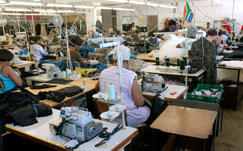A billion dollars to invest in Africa
19 June 2015
Afro pessimists step aside, because the big leagues are bringing their green bucks
to Africa.
That's the message from TPG Growth and Satya Capital, which announced a billion-
dollar investment partnership in Africa on 18 June.
The partnership is TPG's first African-focused investment vehicle. It will invest in
growth stage companies and the next generation of entrepreneurs across the
continent.
Satya managing partner Moez Daya said the partners were looking for
entrepreneurial partnerships "north of the Limpopo River" and which could benefit
South African businesses.
"The growth of the consumer face middle class is greater in sub-Saharan Africa," he
said. "South African growth is a lot more constrained. Growth beyond South Africa
is faster, but more risky.
"The business we do is partnering great companies, those who are breaking through
the [Limpopo] border… We will be the ideal partners for South
African companies
wanting to do that. We bring capital, tools, know-how and the relationships that
we've built across Africa."
Big investment
Satya Capital was started by Sudanese-British billionaire Mo Ibrahim, who sold his
African-based mobile communication company Celtel for $3.4-billion (about R42-
billion) in 2005.
TPG, the global private investment firm, has $74-billion of assets under its
management, while TPG Growth, its middle market and growth equity investment
platform, has $7-billion. The latter's current and past investments represent a mix
of disruptive and innovative companies across tech, retail and entertainment
including Uber, Airbnb, Box, Domo, Beautycounter, Ride, Angie's Artisan Treats,
Fender, SurveyMonkey, Evolution Media and STX Entertainment, among others.
The partnership is TPG's first African-focused investment vehicle. It will invest in
growth stage companies and the next generation of entrepreneurs
across the
continent.
The partnership with Satya Capital, an independent investment firm focused on
Africa, brought deep regional expertise, relationships and on-the-ground
experience, said Daya.
Growth focus
The money will be provided by TPG Growth, which will look for companies and
entrepreneurs in all sectors that are in need of capital to help them grow, including
in health care, technology, media and telecommunications, consumer and financial
services.
While Satya normally targeted investments of between $20-million and $150-
million, this partnership would allow it to broaden the scope to between $1-million
and $200-million, said Daya.
"It is exciting for African entrepreneurs looking for investors," he said. "TPG is
willing to invest up to $1-billion in Africa provided it is the right company. They are
not bound by geography, but go where the opportunity is. However, this partnership
allows them to focus more on
the growth in Africa."
Daya, the former chief executive of Celtel International, said that business was a
"landmark opportunity and company" for Satya Capital. "We've [Satya] been
operating for seven years in Africa and built a portfolio of companies."
Satya Capital, which has capitalised $300-million in Africa, focused on an evergreen
model. "That means we keep recycling the money within a company instead of
withdrawing our investment," he explained.
"We invest in companies without a strict limit on when to leave, which gives
businesses the ability to realise their full potential and brings stability," he said,
adding that the partnership with TPG was not part of his group's evergreen strategy.
Africa risk
Daya said the risk of doing business in Africa had micro and macro elements.
"There is a risk who you do business with and who you partner with, which is
something we factor in," he said.
"South Africans are used to
working in private equity, but that is not the case in
sub-Saharan Africa… A lot of businesses are used to the old way of doing business,
but they need to start looking to the new way. It's a challenge for them and that's
the execution risk.
"Then there is the risk of economy and infrastructure and political risk that goes
with doing business in sub-Saharan Africa," he said. "You also have depreciation
issues, but the underlying growth exceeds most of those risks."
Source: News24Wire
 The factory floor of Hip Hop, a successful fashion label based in Cape Town. (Image: MediaClubSouthAfrica.com, Rodger Bosch)
The factory floor of Hip Hop, a successful fashion label based in Cape Town. (Image: MediaClubSouthAfrica.com, Rodger Bosch)





